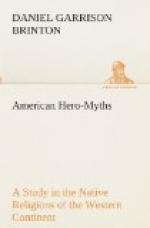Polyonomy is another procedure often seen in these myths. A divinity has several or many titles; one or another of these becomes prominent, and at last obscures in a particular myth or locality the original personality of the hero of the tale. In America this is most obvious in Peru.
Akin to this is what Prof. Max Mueller has termed henotheism. In this mental process one god or one form of a god is exalted beyond all others, and even addressed as the one, only, absolute and supreme deity. Such expressions are not to be construed literally as evidences of a monotheism, but simply that at that particular time the worshiper’s mind was so filled with the power and majesty of the divinity to whom he appealed, that he applied to him these superlatives, very much as he would to a great ruler. The next day he might apply them to another deity, without any hypocrisy or sense of logical contradiction. Instances of this are common in the Aztec prayers which have been preserved.
One difficulty encountered in Aryan mythology is extremely rare in America, and that is, the adoption of foreign names. A proper name without a definite concrete significance in the tongue of the people who used it is almost unexampled in the red race. A word without a meaning was something quite foreign to their mode of thought. One of our most eminent students[1] has justly said: “Every Indian synthesis—names of persons and places not excepted—must preserve the consciousness of its roots, and must not only have a meaning, but be so framed as to convey that meaning with precision, to all who speak the language to which it belongs.” Hence, the names of their divinities can nearly always be interpreted, though for the reasons above given the most obvious and current interpretation is not in every case the correct one.
[Footnote 1: J. Hammond Trumbull, On the Composition of Indian Geographical Names, p. 3 (Hartford, 1870).]
As foreign names were not adopted, so the mythology of one tribe very rarely influenced that of another. As a rule, all the religions were tribal or national, and their votaries had no desire to extend them. There was little of the proselytizing spirit among the red race. Some exceptions can be pointed out to this statement, in the Aztec and Peruvian monarchies. Some borrowing seems to have been done either by or from the Mayas; and the hero-myth of the Iroquois has so many of the lineaments of that of the Algonkins that it is difficult to believe that it was wholly independent of it. But, on the whole, the identities often found in American myths are more justly attributable to a similarity of surroundings and impressions than to any other cause.




